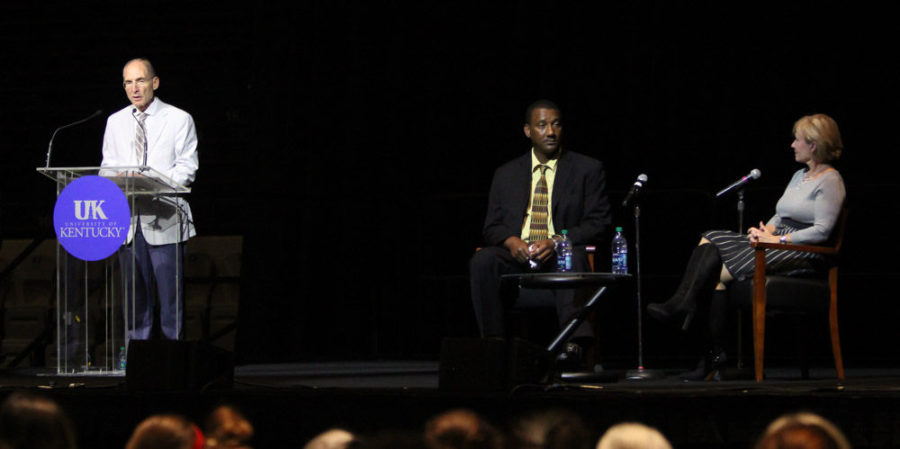Picking Cotton authors speak at Memorial Coliseum on Thursday night
October 9, 2015
By Dan Bodden
Jennifer Thompson and Ronald Cotton, the authors of this year’s Common Reading Experience book, “Picking Cotton,” spoke to the campus community at Memorial Coliseum on Thursday night.
Both speakers took about 30 minutes to tell their parts of the story, recounting and discussing details from the book. and stayed to sign books and talk to students.
The pair was introduced by President Eli Capilouto, who explained the significance of the CRE.
Picking Cotton is a true story written by Thompson and Cotton with the help of author Erin Torneo. It tells the story of how Thompson was sexually assaulted in college, and how mistakes in the criminal justice system resulted in Thompson incorrectly identifying Cotton as the perpetrator — Cotton was wrongly convicted of the rape.
Cotton spent 11 years in prison before being exonerated through DNA evidence. Thompson and Cotton formed an unlikely bond after the case and have fought for criminal justice reform nationwide ever since.
“It was amazing,” said Mojdeh Khoshnavaz, a student who traveled from the University of Central Missouri to hear the speech. “I think it’d be really hard if I were him to forgive someone like he did —it’s amazing that there’s good people out there who know how to forgive. It was well worth the nine hour drive.”
Khoshnavaz is currently working on a project on Cotton’s case for an upcoming symposium and has been researching wrongful conviction cases since last spring.
As this year’s CRE book, all freshmen were given a copy of Picking Cotton to read before the semester began, and students in UK 101 have participated in instruction based on the book.
According to Assistant Director of New Student and Family Programs and CRE Coordinator Kasey Borchardt, the goal of the CRE is to spark discussions among freshmen and introduce the incoming students to the critical thinking and academic discourse prevalent in college. There will be more CRE events throughout the year that will address the wide range of complex issues discussed in the book.
“There’s so many stories in our story,” Thompson said. “I think it’s going to resonate differently to different people.”
“It’s a story of violence against women. It’s a story of mass incarceration and race,” Thompson said. “It’s a story of eyewitness identification and memory, and how that plays a role in the criminal justice system. And it’s a story about harm that can be turned into healing.”
Because of the sensitive nature of the book’s topic, a letter from President Capilouto was included with the book, introducing the story and providing a trigger warning for sexual assault survivors. Borchardt said she believes many students are proud of the university for being willing to talk about the book’s controversial content.
“There were some parents that said, ‘Now, tell me more about this book, and what it means and what it entails,’ so we were able to give a little more background,” Borchardt said. “But, so far people that I’ve heard are super excited that UK is willing to push the envelope a little bit and really have this tough situation — this tragic story — but turn around and look at the great things that Jennifer and Ronald are doing now. Their lives have changed forever, but they’re doing positive things about it.”
For Cotton and Thompson, it is still difficult to recount the tragic events they experienced, but they continue to speak at colleges and events across the country in hopes of inspiring others with their story.
“There are victims that haven’t been surfaced yet, and they need to be,” Cotton said. “Some of them are sitting in the background and hurting themselves by not coming forward. Eventually, by hearing our story, it will entice them to come forward.”
Although the book was chosen as the 2015-16 CRE two years ago and the story itself took place more than 30 years ago, the topics are still extremely relevant in 2015, according to Borchardt.
“This book was set in the 1980s and it’s still happening in 2015,” Borchardt said. “It really gives students a base on which to start talking about these issues that I know they’re passionate about, and then (it) kind of gives them a voice to talk about what’s really important to them,” Borchardt said. “It’s crazy that a book that took place in the ‘80s is still relevant today.”























































































































































